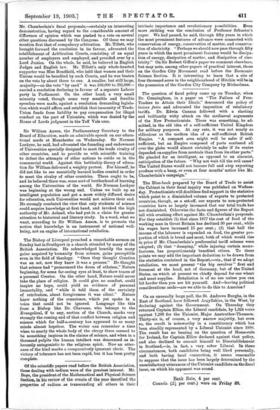The Bishop of Liverpool preached a remarkable sermon on Sunday
last in Southport in a church attended by many of the British Association. He acknowledged heartily the many gains acquired by humanity from science, gains perceptible even in the field of theology. " Once they thought Creation was an act, now they knew it was a process." He thought that science had "pronounced the doom of atheism," Nature beginning, for some far-seeing eyes at least, to show traces of a personal Creator. On the other band, Nature could never take the place of religion. It could give no comfort, could inspire no hope, could yield no evidence of personal immortality, and " while it told them of the certainty of retribution, about foregiveness it was silent." Nature knew nothing of the conscience, which yet spoke in a voice that could not be ignored. Language like this from a Bishop like Dr. Chavasse, who belongs to the Evangelical, if to any, section of the Church, marks very strongly the coming end of that conflict between religion and science which for half-a-century has appeared to so many minds almost hopeless. The writer can remember a time when to nearly the whole body of the clergy there seemed to be something impious in the claims of science, and when in a thousand pulpits the human intellect was denounced as in- herently antagonistic to the religious spirit. Now an utter- ance of the kind marks a comparatively ignorant cleric. The victory of tolerance has not been rapid, but it has been pretty complete.






































 Previous page
Previous page